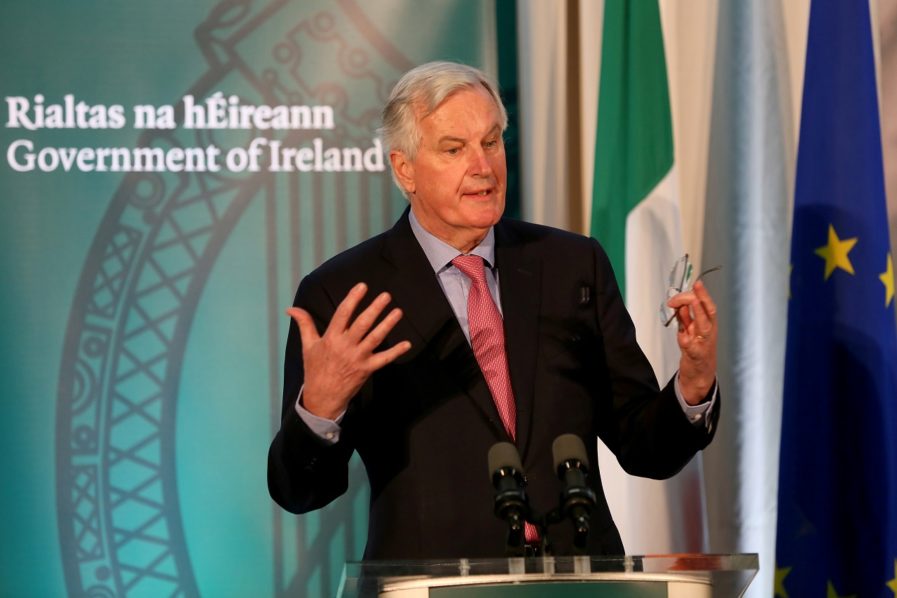 |
| European Union chief Brexit negotiator Michel Barnier speaks during a press conference at the All-Island Civic Dialogue on Brexit, at the Dundalk Institute of Technology in Dundalk, north-east Ireland on April 30, 2018. The European Commission’s chief Brexit negotiator Michel Barnier warned Monday that the talks were at “risk” because of disagreements over the future of the Irish border after Britain leaves the European Union. At a press conference during his visit to Ireland, Barnier called for a “clear and operational solution for Ireland” to be included in the Brexit deal, adding: “Until we reach this agreement, there is a risk”. / AFP PHOTO / Paul FAITH |
The European Union’s chief Brexit negotiator Michel Barnier warned Monday that the talks were at “risk” due to disagreements over the future of the Irish border after Britain leaves the EU.
At a press conference during his visit to Ireland, Barnier called for a “clear and operational solution for Ireland” to be included in the Brexit deal, adding: “Until we reach this agreement, there is a risk”.
Irish Prime Minister Leo Varadkar warned that Britain’s “approach to negotiations will need to change in some way” if there is to be agreement over the issue.
“Without a solution to the Irish border question, there can be no EU withdrawal agreement,” he added.
London has committed to avoid a “hard border” with checkpoints between Northern Ireland, part of the UK, and EU-member Ireland, which all sides agree is vital to maintaining the 1998 Good Friday peace accords.
However, Britain has also said it will not enter into a customs union with the EU post-Brexit, and has been urged to find a solution to reconcile the two positions.
The EU has suggested a “backstop” proposal, in which only Northern Ireland would stay in a customs union with the EU post-Brexit.
“The backstop we put in the draft treaty, is not there to change the UK red lines, it is there because of the UK red lines… on the customs union and single market,” said Barnier.
“Only Northern Ireland-specific solutions will work,” he added.
“We need to agree rapidly by June on several new points, on the scope of alignment, customs and regulations.”
Britain wants to be free of the EU customs union in order to be able to strike trade deals with the rest of the world post-Brexit.
Lords battle
Barnier rejected claims that the backstop solution threatened Britain’s sovereign integrity following criticism from Arlene Foster, head of Northern Ireland’s Democratic Unionist Party.
She said Monday that Barnier’s “proposal of us being in an all-Ireland regulatory scenario with a border down the Irish Sea simply does not work. It does not work constitutionally, politically and it certainly does not work from an economic perspective.”
Barnier acknowledged the backstop proposal was “the subject of heated discussions in the UK”, and said there were “three points to avoid any misunderstandings”.
Firstly, he said both the EU and Britain were “firmly committed to a backstop” as a last resort, and secondly that the proposal was not part of a negotiation strategy.
“We are not playing tactics with Ireland’s vital interest,” he insisted.
Finally, he said the backstop was needed “in order to respect the integrity of the single market and the EU’s customs union.”
Brussels has so far rejected London’s technological solutions to avoid a hard border, and Prime Minister Theresa May is under increasing pressure at home over the issue.
The upper House of Lords earlier this month dealt her a damaging defeat, passing an amendment to a key piece of legislation, requiring ministers to explain the steps taken to negotiate Britain’s continued participation in a customs union.
The amended bill will return to the lower House of Commons for debate, likely in May, when pro-EU members of the governing Conservative Party will have to decide whether to make a stand.
The Lords could deliver another blow later Monday with reports that they are to vote on a cross-party proposal which would block a “no deal” outcome from the negotiations, meaning that Britain would remain in the EU until a deal was struck.
Pro-Brexit MP Jacob Rees-Mogg warned the unelected peers were risking the upper chamber’s credibility.
“When it opposes the democratically elected government and tries to stop legislation as a house of appointed people — many of them getting pensions from the European Union — it does its own reputation a huge amount of damage,” he told LBC radio.
AFP
In this article:
